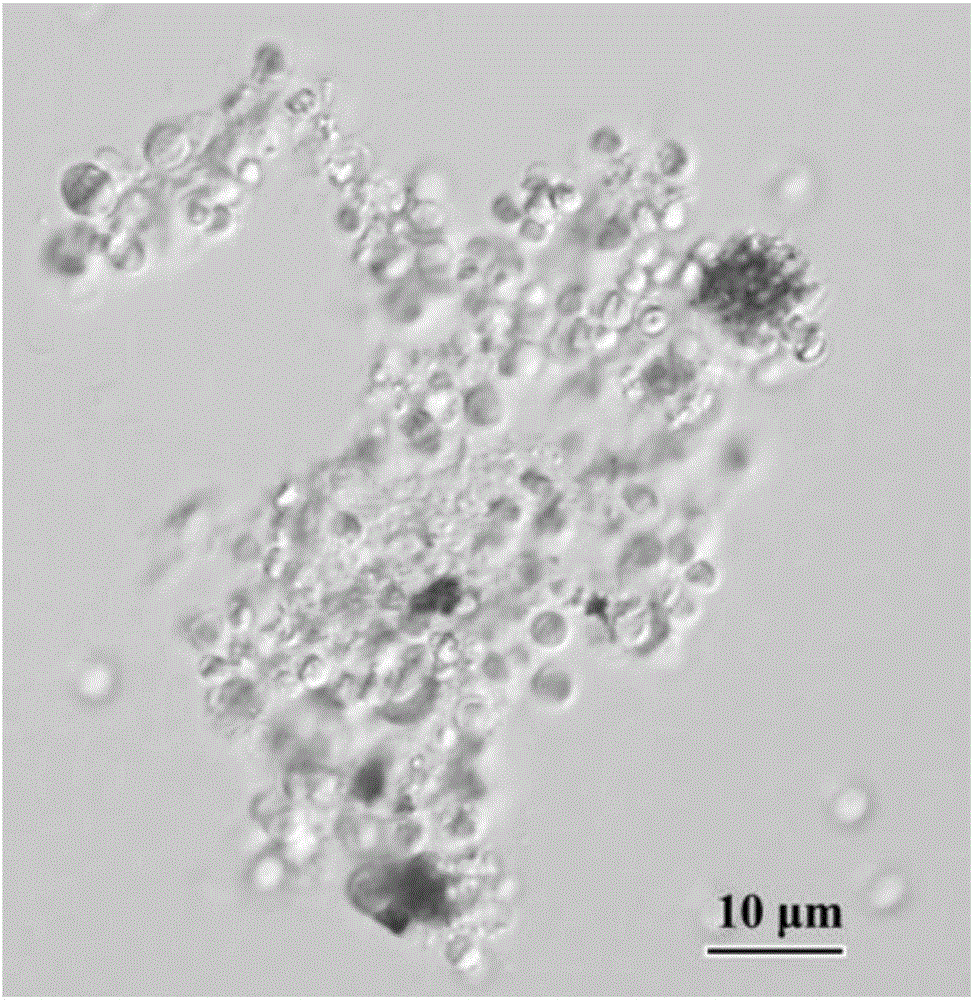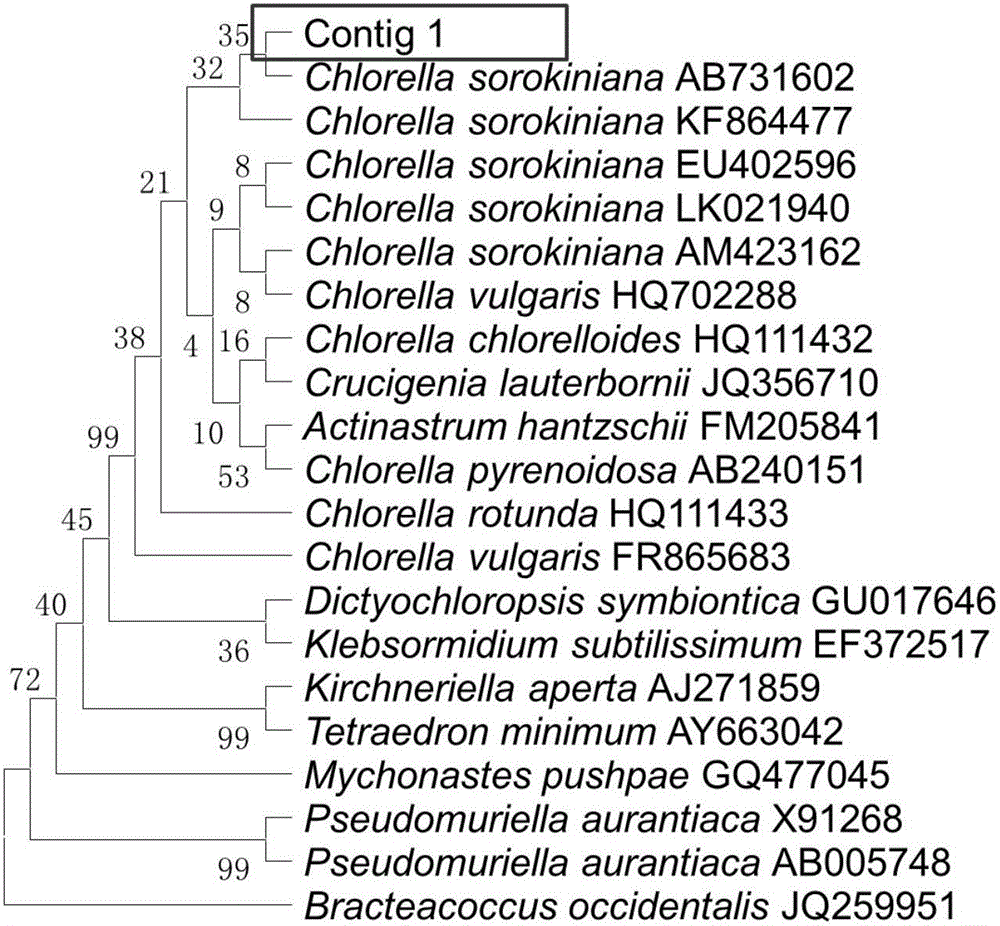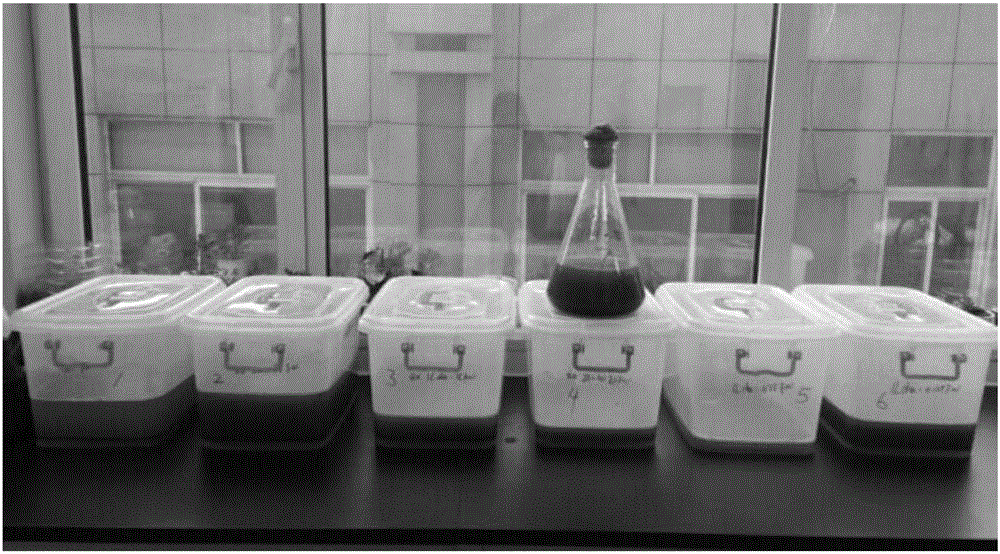Chlorella sorokiniana capable of producing high-yield protein, and culture method and application thereof
A culture method, chlorella technology, applied in the direction of microorganism-based methods, applications, chemical instruments and methods, etc., can solve the problems of difficult organism utilization of protein, thick algae cell wall, low protein production, etc., and achieve favorable absorption and utilization , high protein content and high degradation rate
- Summary
- Abstract
- Description
- Claims
- Application Information
AI Technical Summary
Problems solved by technology
Method used
Image
Examples
Embodiment 1
[0021] Example 1: Isolation, screening and identification of algal strains
[0022] 1 sample collection
[0023] Chlorella isolation sample collection location: cesspool and manure discharge ditch of Ningyang pig farm in Taian, Shandong.
[0024] 2 Separation and screening of algae strains
[0025] 2.1 Test material: The culture medium used in this embodiment is Zhu's No. 10 medium, and 1% (mass percentage) of agar is added to its solid medium, and no agar is added to its liquid medium. The composition of the medium is shown in Table 1.
[0026] Table 1 Composition of Zhushi No. 10 Medium
[0027]
[0028]
[0029] 2.2 Test method
[0030] 2.2.1 Place the collected samples in a light incubator at 30°C for 5-7 days. After turning green, carry out 10, 50, 100, 500 and 1000-fold gradient dilution with Zhushi No. 10 liquid medium, and take After dilution, 100 μL of the sample was evenly spread on Zhushi No. 10 solid medium, and placed in a light incubator at 30°C for cu...
Embodiment 2
[0096] Embodiment 2: the application in the production protein of chlorella of the present invention
[0097] 1 Determination of the amount of algae powder required for the determination of protein content
[0098] 1.1 Test material
[0099] Algae strain: Chlorella sorokiniana BL-ch1 obtained by screening and separating in Example 1 of the present invention;
[0100] Medium: Zhushi No. 10, formula: 0.1g sodium nitrate, 0.01g dipotassium hydrogen phosphate, 0.25g magnesium sulfate, 0.02g sodium carbonate, 0.025g sodium silicate, 0.008g ferric chloride, 1L of water.
[0101] 1.2 Test method
[0102] Biomass detection --- weighing bottle method;
[0103] Protein content detection --- Kjeldahl method.
[0104] 1.3 Test steps
[0105] Prepare Zhu’s No. 10 medium, inoculate the algae strain BL-ch1 into the medium, culture at 33°C for 5 days, centrifuge the algae liquid at 5000r / min for 5min, concentrate the obtained algae mud, wash it three times with pure water, and then wash ...
Embodiment 3
[0179] Embodiment 3: Application of Chlorella of the present invention in degrading feces and sewage
[0180] 1 Experimental design
[0181] The experimental design is shown in Table 21.
[0182] Table 21 Design of Chlorella Degradation Fecal Sewage Test
[0183]
[0184]
[0185] The cultivation method of the algae liquid: the algae strain is the algae strain BL-ch1 screened in Example 1 of the present invention, the inoculum size is 10% (volume fraction), the liquid volume is 600mL / L, the initial pH value is 7.0, and the temperature is 28°C-33°C .
[0186] Considering the smell of feces and the convenience of sampling, this experiment adopted a sorting box with a cover, and used a 3L triangular flask to compare the difference in illuminance, as shown in image 3 shown.
[0187] 2 Experimental results
[0188] 2.1 Degradation of total nitrogen (total nitrogen content mg / L)
[0189] The results are shown in Table 22.
[0190] Table 22 Degradation Results of Total ...
PUM
| Property | Measurement | Unit |
|---|---|---|
| diameter | aaaaa | aaaaa |
Abstract
Description
Claims
Application Information
 Login to View More
Login to View More - R&D Engineer
- R&D Manager
- IP Professional
- Industry Leading Data Capabilities
- Powerful AI technology
- Patent DNA Extraction
Browse by: Latest US Patents, China's latest patents, Technical Efficacy Thesaurus, Application Domain, Technology Topic, Popular Technical Reports.
© 2024 PatSnap. All rights reserved.Legal|Privacy policy|Modern Slavery Act Transparency Statement|Sitemap|About US| Contact US: help@patsnap.com










